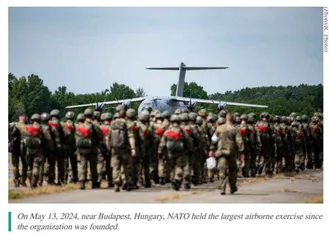The 2024 Global Security Dynamics:Rising Risks of Instability and Growing Demand for Governance
作者: Tang Yongsheng

In 2024, as the world underwent profound political changes, global security faced increasing instabilities and uncertainties. Traditional and non-traditional security threats interacted and overlapped, and the risk of turmoil increased. Strategic trust among major powers continued to erode, leading to heightened insecurity and intensified competition. Regional conflicts persisted, with some at risk of spiraling out of control. Despite this, global strategic stability can still be maintained, as peace, stability and development remain the common goals of most nations and their people. The call for global security governance is growing louder.
Security and Governance Deficits Grew amid Deepened Global Changes
The world is witnessing more chaos in political transformations, leading to greater security risks. Global development remains uneven, becoming a key source of instability. In December 2024, the UK International Institute for Strategic Studies released its Annual Survey of Armed Conflicts. By analyzing global conflicts from 1 July 2023 to 30 June 2024, the report revealed over 200,000 deaths in armed conflicts, a 37% increase from the previous year, with the Middle East and North Africa seeing a 315% rise in fatalities. The ongoing Israel-Palestine conflict and Israel’s restrictions on humanitarian aid have caused an unprecedented crisis, displacing 90% of Gaza’s population and leaving 340,000 in dire conditions.
Outdated logic of hegemony, power politics, zero-sum games, and Cold War thinking persisted, undermining trust and escalating tensions. Regional conflicts and wars broke out more than before. Some nations strengthened exclusive military alliances and pursued absolute security at the expense of global stability. Global arms control and disarmament faced setbacks, and the arms race ramped up its pace. The proliferation risk of weapons of mass destruction grew. The global non-proliferation regime faced challenges. Terrorism and extremism threats remained unchecked, while emerging areas such as cyberspace, outer space, deep sea and biotechnology became ever more important. The competition over rule-making intensified.
In this era of changes and turbulence, old security issues remain unresolved and new ones keep popping out, worsening security and governance deficits. In September 2024, UN Secretary-General António Guterres warned during the 79th UN General Assembly that, “our world is in a whirlwind. We are in an era of epic transformation -- facing challenges unlike any we have ever seen -- challenges that demand global solutions. Yet geo-political divisions keep deepening. The planet keeps heating. Wars rage with no clue how they will end. And nuclear posturing and new weapons cast a dark shadow. We are edging towards the unimaginable -- a powder keg that risks engulfing the world.” He also pointed out that, “the differences and divisions today are just too great. That it is impossible for us to come together for the common good.” “We are in a purgatory of polarity. And in this purgatory, more and more countries are filling the spaces of geopolitical divides, doing whatever they want with no accountability.”
The Ukraine crisis, now in its third year, has reached a stalemate. Russia and Ukraine are locked in a war of attrition, with neither side gaining a decisive advantage. It hinges on the international community to create conditions for peace talks. China’s stance on the crisis represents where the future shall go: the international community should support all efforts aimed at resolving the Ukraine crisis in a peaceful way, oppose the use or the threat of use of nuclear weapons, work to ensure the stability of global industrial and supply chains; and cooperate to improve the humanitarian situation and prevent a potentially larger-scale humanitarian crisis.
From the evolution of the Ukraine crisis, one can clearly see that the marginal effects that could potentially be gained for relevant parties, including the U.S., have diminished greatly. Yet, if one reads the crisis in the context of its motives and impacts, its political takeaway becomes ever clearer: the traditional geopolitical rivalry is greatly limited in its role in addressing geopolitical issues of today. Historically, Europe’s geopolitical boundaries have been pushed back and forth like an accordion, but today, NATO’s eastward expansion cannot subdue Russia, and Russia’s special military operation also met with strong countermeasures from the West. The stalemate in the Ukraine crisis further showed that only by transcending the traditional geopolitical thinking and adhering to the spirit of dialogue and consultation can relevant parties find effective ways out.
The changes in the international system can often be mirrored by one crisis or event. On that note, the impact of the Ukraine crisis weighs more than that of the Kosovo War, the Iraq War, or even the Afghanistan War. There is a lot to be learned from both history and reality. The September 11 terrorist attacks revealed, in an extreme way, the intrinsic problems in international politics, indicating that the old system could no longer provide the necessary conditions and guarantees for global development and security. The subprime mortgage crisis demonstrated that when capital expansion reached its limit and financial products were recklessly introduced, the overstretched financial chain would inevitably break. Similarly, Donald Trump’s return to the White House reflects the severe economic structural imbalances and socio-political divisions in the U.S., signaling the decline of liberal capitalism and a shift toward conservatism in its domestic and foreign policies. It also means that the political and economic dividends gained from the end of the Cold War have been exhausted.